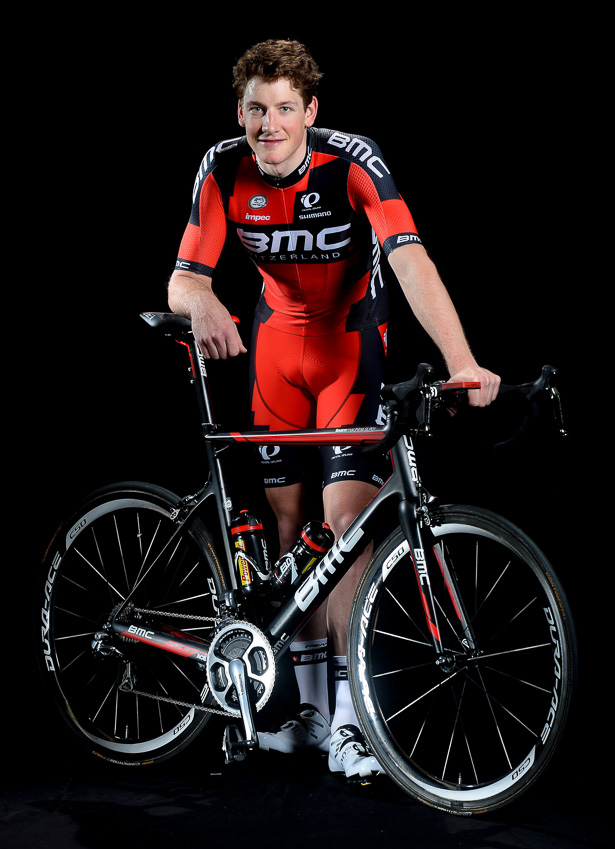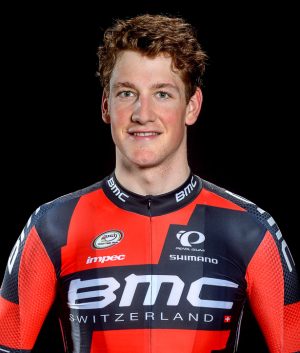
By our reckoning when Stefan Küng took bronze in the individual pursuit in 2013 it was Switzerland’s first pursuit medal since Robert Dill-Bundi’s pro silver some 30 years prior on his home Zürich track in 1983.
But whilst that was as good as it got for the tall, precocious Swiss who never fully realised his potential, it was just the start for Küng.
Bronze became silver in 2014 and the alchemy was complete earlier this year in Paris when the young BMC rider from Wil became the first Swiss rider since the fabulously stylish Xavier Kurmann back in 1970 on the Leicester track in England to pull on the rainbow jersey of world individual pursuit champion.
Students of U23 road racing will recognise Küng’s name as winner of the 2014 Tour of Normandie; 2014 European U23 road race and time trial championships – as well as bronze medallist in the World U23 time trial championships, and just today he finished a strong second to Team Sky’s Bradley Wiggins in the technical Three Days of De Panne time trial, in front of in-form Katyusha strong-man Alexander Kristoff.
Thanks to BMC’s Georges Luchinger we were granted an exclusive interview with the 2015 World Pursuit Champion; here’s what he had to say to VeloVeritas not long after his triumph in Paris:
Thank you for speaking to us, Stefan and congratulations on the title – you were second in 2014, was that a big motivator for you?
“Yes, I was second in 2014 but also third in 2013 so it was definitely a big motivation to win it.
“It’s logical that you should go, three, two, one – but sport isn’t always logical.
“When I was finding it hard to focus in training I’d think about how it felt losing the title by two tenths of a second, last year.
“I thought about that during the final, too – it makes you go as hard as you can!”
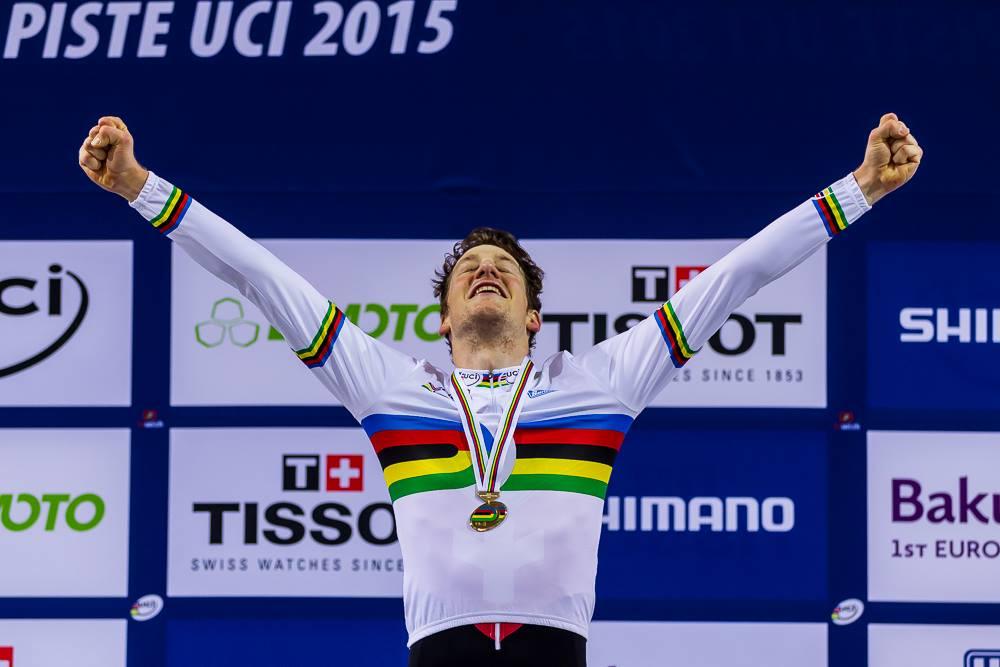
What’s BMC’s attitude to your track racing – it’s not a priority for some of the big teams?
“I have the full support of BMC; they were really great and gave me a lot of time to prepare especially for the team pursuit.
“And the cooperation between the team and the national federation was very good.”
How much time did you devote to specialist training for the pursuit?
“I did a lot of track training with the main focus on the team pursuit because it’s an Olympic discipline – but that training is also good for the individual pursuit.
“But I did spend time training on my own at the Grenchen Velodrome training to hold my power for four-and-a-half minutes – and I did extra training for it on the road.”
Is it not difficult to fit pursuit training in with your preparation for the road season?
“Very difficult especially with training camps if you’re training in the hills or mountains – the pursuit is a different effort with high cadence and high power.
“After the Dubai Tour I had one week on the track to acclimatise and the result shows that it was long enough to be successful…
“Road training is good background; you just have to shape things for the pursuit.”
Tell us about your BMC track machine, please – and your tyres and gearing.
“I think it’s the best track machine that’s available; the same bike as Rohan Denis rode to the Hour Record – although his had a modified cockpit which we’ll have for Rio in 2016.
“It’s easy to handle, very aero and easy to adjust with my 3T ‘bars to find the ideal position – BMC spent a lot of time with us on the pursuit team to get it right.
“I rode 19mm Continental Olympic tubulars with a 50×13 gear ratio.”
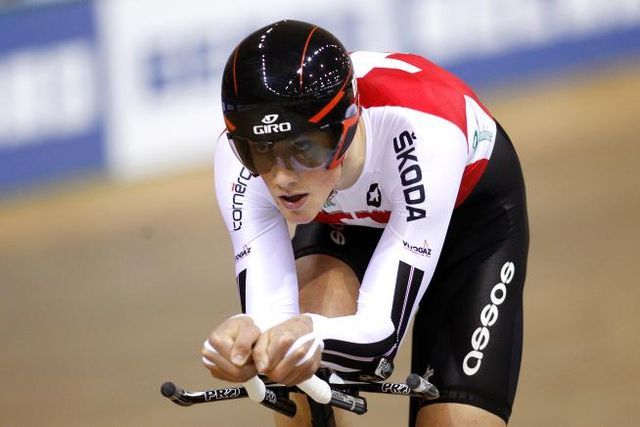
Do you have a coach – what’s the philosophy?
“I work with David Bailey on the BMC team and with the national coach, Daniel Gisiger (himself a Worlds amateur pursuit bronze medallist in 1977 and winner of the GP des Nations and Baracchi Trophy as a professional) who I have worked with for years.
“The philosophy is ‘patience’ – go step by step, I don’t want to get there fast; I want to be able to look back and see how we did what we did.
“I think my pursuit times prove what I mean, two years ago I rode 4:22 I brought that down to 4:20 six months later; then 4:19, 4:17 and now I want to get to 4:15 – and there’s still a big margin after that.”
Switzerland has come a long way in a short time in the team pursuit, how so?
“The programme was started a few years ago by Daniel Gisiger to get the best Swiss riders together – road or track – and make them ride fast.
“We were never forced to ride the track but the training camps and opportunities were there for us at the velodrome at Aigle.
“As juniors we had fun; we’re still all young guys and it’s more like a family than a team atmosphere.
“Switzerland is a small country and the talent we have has to be carefully developed – it’s not like Great Britain where they have so many more riders.”
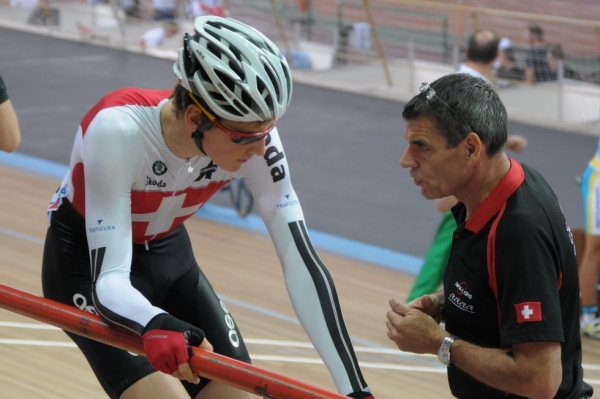
Will you defend your individual title in London or will the focus be on the team pursuit in Rio?
“I’ll definitely defend my title in London, yes – I’ll be there to ride the team pursuit but want to get down to 4:15 for the individual effort.”
You won the Tour of Normandie last year – that’s a tough one to win.
“It was a very big win for me; it showed I was consistent over a one week race and that I could ride as a team leader.
“I won the prologue then we lost the jersey but I kept attentive and waited for my chance – which came on the last day and I took it.
“If you keep attentive and are in good shape then when the chances come, you can take them.”
You were top 12 in the U23 Paris-Roubaix; is that perhaps a goal for the future for you?
“Yes, Paris-Roubaix is a very nice race; I really like it.
“There was a breakaway of 11 riders from the start then the peloton lost 4:30 at a railway crossing and I was 12th, the best after the 11 guys who were away.
“My DS, Rik Verbrugghe said I was the strongest on the day; for me it’s a beautiful race, I really like the cobbles; I think about it when I’m training and one day I’d like to come on to that track and be in a position to win.”
You won bronze in the TT at the Ponferrada Worlds – but it’ll be the Elite Worlds TT this year – are you looking forward to that one?
“I hope I can do the TTT also – I won’t make it a special goal but I’ll try to do my best performance.
“I’m really looking forward to it and think I have stepped up a level and will be ready for it.”
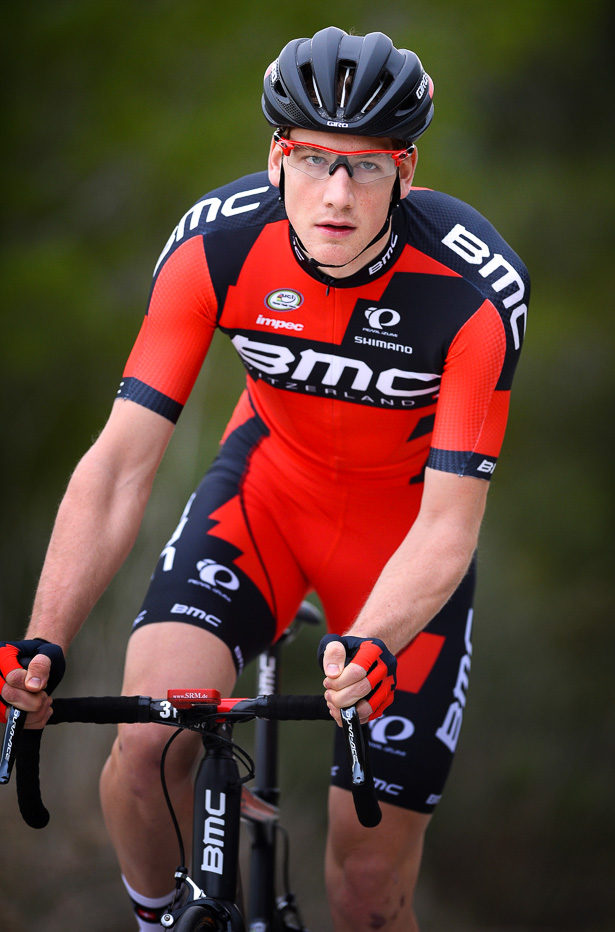
Was the World U23 Road Race your last race of 2014 – did you get much of a winter break with all of your track commitments?
“Yes, the Worlds was my last race of 2014; it was a very long season and I was a bit tired at the end – but I learned a lot during the course of it.
“I had two weeks complete break after the season then it started all over again – but I try to out in small breaks during the season so as I don’t over work myself.
“But I have a great team behind me; when they see I have been doing too much they take me out of competition.”
You rode the Tour of Dubai before the Worlds…
“Dubai was a very good experience – I learned a lot, it was for sure not the hardest race but it was very different to U23 racing.
“It was a pleasure to ride with and for such a great team.”
Unfortunately, Stefan came down with sickness after the Worlds so there was no Het Nieuwsblad or Kuurne for him, but as we mentioned in our intro Stefan finished a great second to Bradley Wiggins in the De Panne ITT so we hope to see him in the thick of the action in the rest of the Northern Classics this month – we’ll be keeping an eye on his progress.
With thanks again to Stefan and Georges Luchinger at BMC for their help and patience.
